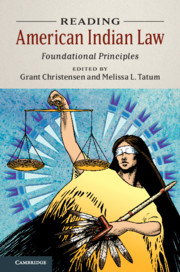Book contents
- Reading American Indian Law
- Reading American Indian Law
- Copyright page
- Dedication
- Contents
- Editors and Contributors
- Preface
- Acknowledgments
- Introduction
- Part I Core Concepts
- Part II Voices
- 5 “Life Comes from It”: Navajo Justice Concepts
- 6 Tribal Court Praxis: One Year in the Life of Twenty Indian Tribal Courts
- 7 Beyond Indian Law: The Rehnquist Court’s Pursuit of States’ Rights, Color-Blind Justice, and Mainstream Values
- 8 A Narrative of Sovereignty: Illuminating the Paradox of the Domestic Dependent Nation
- Part III Property
- Part IV (Mis)Understandings
- Book part
- References
8 - A Narrative of Sovereignty: Illuminating the Paradox of the Domestic Dependent Nation
from Part II - Voices
Published online by Cambridge University Press: 11 December 2019
- Reading American Indian Law
- Reading American Indian Law
- Copyright page
- Dedication
- Contents
- Editors and Contributors
- Preface
- Acknowledgments
- Introduction
- Part I Core Concepts
- Part II Voices
- 5 “Life Comes from It”: Navajo Justice Concepts
- 6 Tribal Court Praxis: One Year in the Life of Twenty Indian Tribal Courts
- 7 Beyond Indian Law: The Rehnquist Court’s Pursuit of States’ Rights, Color-Blind Justice, and Mainstream Values
- 8 A Narrative of Sovereignty: Illuminating the Paradox of the Domestic Dependent Nation
- Part III Property
- Part IV (Mis)Understandings
- Book part
- References
Summary
A Narrative of Sovereignty: looks at the tangible ramifications that Supreme Court decisions have had and continue to have on reservation life. The piece focuses on the Navajo Nation and tracks how its tribal laws and policies have evolved with changing Supreme Court decisions from 1970 to 2003 to try to meet the needs of its people while living with the limits placed upon its authority by the courts. Krakoff concludes that courts need to be more cognizant of the effects of their decisions on reservation communities to ensure the cultural survival of American Indians.
- Type
- Chapter
- Information
- Reading American Indian LawFoundational Principles, pp. 188 - 210Publisher: Cambridge University PressPrint publication year: 2019

